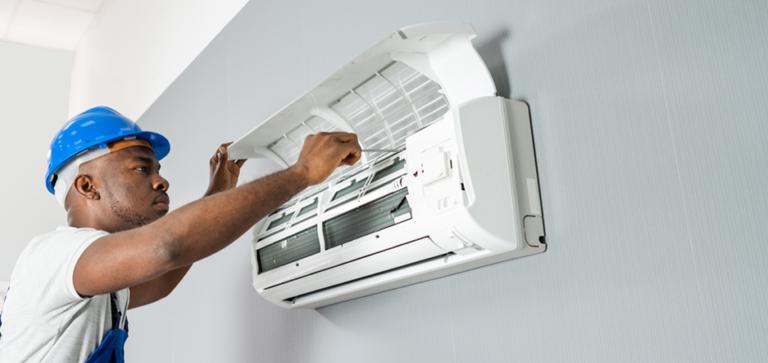It can be annoying, particularly during the hottest months, when your air conditioner begins to perform poorly. Many common AC problems can be resolved with a few easy and quick steps, but some may need professional repairs. Without needing an expensive service call, routine maintenance and minor tweaks can help your air conditioner operate more efficiently, increase airflow, and keep your house cool.
This guide will cover five quick fixes for AC performance issues that you can do yourself. From cleaning or replacing the filter to checking for leaks and inspecting refrigerant levels, these steps are easy to follow and can make a significant difference in how well your AC operates. By addressing these common issues, you can keep your system running smoothly, extend its lifespan, and ensure that you stay comfortable during the hot weather.
Here are some quick fixes for AC performance issues.
1. Check the filter
One of the most common reasons for reduced AC performance is a dirty or clogged filter. The filter is responsible for trapping dust, dirt, and debris from the air before it enters the system. Over time, the filter can get clogged, reducing airflow and cooling efficiency. When airflow is restricted, your AC has to work harder to cool the air, leading to higher energy consumption and reduced cooling power.
To fix this issue, check the filter regularly—especially during peak usage months—and clean or replace it as needed. Depending on the type of filter, it might only need a gentle cleaning or a complete replacement. This simple step can improve your AC’s efficiency, help it run smoother, and reduce the chances of other problems developing.
2. Unblock Vents
Another common issue is blocked or obstructed vents. Dust, debris, and even furniture can sometimes block the airflow from your AC, reducing its efficiency and cooling power. When vents are blocked, the system has to work harder to circulate cool air, which can cause the AC to overheat and wear down faster.
To resolve this, inspect all the vents in your home, especially those that are not directly visible or easily accessible. Vacuum any dust or debris that has accumulated inside the vent openings. Ensure that furniture or curtains are not obstructing the airflow. By allowing unobstructed airflow, your AC will be able to cool your space more effectively and efficiently.
3. Check for leaks
Leaks around windows, doors, or in the attic can significantly affect your AC’s performance. Gaps and leaks allow cool air to escape and warm air to enter, forcing your air conditioner to work harder to maintain the desired temperature. Common leak areas include windows and doors that don’t seal properly or ductwork that has developed holes over time.
To address this issue, check for drafts near doors, windows, and air ducts. Use weatherstripping or caulk to seal gaps in window frames or around door edges. If you notice leaks in the ductwork, consider using duct tape or sealing compounds to patch them. By minimizing leaks, your AC will retain more cool air, leading to better overall efficiency.
4. Check the refrigerator
Low refrigerant levels can be a major issue for air conditioners. The refrigerant is essential for cooling the air as it absorbs heat from inside your home and releases it outside. If the refrigerant is low, your AC will struggle to cool the air effectively, and the system might not cool your home at all.
To fix this, inspect your AC for signs of refrigerant leaks or low levels. If you suspect low refrigerant, contact a professional HVAC technician to refill the refrigerant and repair any leaks. It’s essential to address refrigerant issues promptly, as running an AC with low refrigerant can damage the compressor, leading to expensive repairs.
5. Check the circuit breaker
A tripped circuit breaker can indicate that something is wrong with your AC, such as a power surge, electrical issue, or a more serious mechanical problem. If your AC suddenly stops working, check the circuit breaker to see if it has tripped. Sometimes, simply resetting the breaker can restore power to the system.
However, if the circuit breaker keeps tripping, this could signal a deeper issue, such as a short circuit, faulty wiring, or a clogged air filter. In such cases, it’s important to consult an HVAC technician to diagnose and fix the underlying problem. Continuously resetting the circuit breaker is not a solution and could lead to further damage or safety hazards.
Conclusion
Addressing AC performance issues with quick fixes like checking filters, unblocking vents, and inspecting refrigerant levels can significantly improve cooling efficiency, especially in warmer climates. These straightforward maintenance steps not only help prevent larger issues but also extend the lifespan of your AC unit. For anyone experiencing recurring issues, it's essential to invest in quality Ac parts in UAE, which ensures that the replacement components match the quality standards needed for optimal functioning. Simple steps can go a long way in enhancing AC performance, especially with the right parts and tools.
If more extensive repairs are necessary, sourcing reliable AC spare parts from trusted suppliers is essential. Many reputable AC spare parts dealers in Dubai offer a wide range of components tailored to the unique requirements of various AC models, ensuring that residents and businesses can access top-quality solutions for any repair. By maintaining regular upkeep and using dependable parts, you can keep your AC running efficiently and comfortably handle the UAE’s intense heat.



